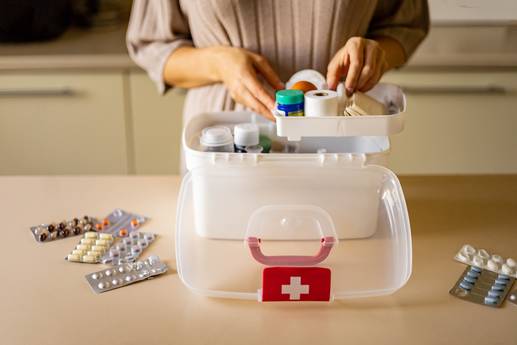When a cold, headache or gastrointestinal infection occurs, most sufferers only need to reach into their own emergency medicine cabinet.
To avoid finding yourself with an empty medicine cabinet when unexpected symptoms occur, your medicine cabinet should always be stocked with the right emergency medications.
Reading tip
The drug experts atStiftung Warentestrecorded.
Home medicine cabinet: This is a must!
A normal medicine cabinet normally contains various Association and aids as well as over-the-counter medications.
Experience has shown that these are often useful and provide quick relief for complaints such as pain and fever, for treating diarrhea or for disinfecting and healing wounds.
The basic equipment should always be replenished and maintained in order to be able to act quickly in an emergency.
It should also be noted that different groups of people – such as pregnant women, children or seniors – often need to take different doses of preparations.
Medicines that are indispensable
Your head is pounding, your throat is scratchy, or you suddenly feel nauseous, all of which cause general discomfort.
Depending on your symptoms, it might be the middle of the night, a Sunday, or the nearest pharmacy might not be around the corner.
So it’s a good idea to keep nasal drops and the like in your own medicine cabinet – and also have the following remedies in the cupboard.
Reading tip
1. Remedies for colds
An inflamed or blocked nose can be quite annoying. So drops or a suitable spray are a must in your medicine cabinet.
Care should be taken to ensure that the medication contains decongestants such as xylometazoline or oxymetazoline – these clear the nose.
Nasal drops or nasal spray for a cold should never be used for longer than five to seven days.
If you use the medication for a longer period of time, you run the risk that the nasal mucosa will become accustomed to the medication and swell up again after you stop taking it.
For children under 6 years of age, an age-appropriate dosage is recommended.
2. Something to disinfect wounds
A small cut or abrasion can happen quickly in everyday life. Proper healing must now be ensured as quickly as possible – no matter how small the injury.
Bacteria, fungi and viruses can quickly spread to the wounded areas – a suitable disinfectant can remedy this even after a single application.
For sensitive skin, the active ingredients povidone-iodine and octenidine/phenoxyethanol are recommended – they do not burn as much and are also suitable for injuries in children.
To support the healing process, you can use creams and ointments containing dexpanthenol or ointments containing zinc oxide for external use.
3. Quick relief for fever and pain
In the fight against headaches or aching limbs, the active ingredients ibuprofen, paracetamol or acetylsalicylic acid (ASA) usually help – they relieve mild to moderate pain and reduce fever.
To avoid possible side effects, attention should be paid to the exact dosage, which is stated in the package leaflet.
There are special preparations for children such as suppositories or syrups. However, ibuprofen and paracetamol are already suitable for children under 12 years of age – if the dosage is age-appropriate.
4. Unpopular: Diarrhea
Anyone suffering from sudden diarrhea should resort to electrolyte mixtures. Dissolved in water, electrolytes replace important substances that are lost during diarrhea.
This is especially important for children and the elderly, as otherwise they run the risk of dehydration.
In addition, a drug containing loperamide could also be used to combat diarrhea – this active ingredient ensures a calm bowel and helps with severe, cramp-like diarrhea.
The medication should be taken for a maximum of two days without consulting a doctor.
Reading tip
5. Get rid of a sore throat
When you have a sore throat, swallowing often becomes a torment. To make this easier, you need one thing above all: lots of saliva.
This moistens the throat mucosa and makes swallowing easier. It also contains antibodies that fight cold germs.
Throat or cough drops or lozenges containing Emser salt can stimulate saliva flow and thus relieve symptoms.
It doesn’t matter which product you choose to suck on. Most throat lozenges contain anaesthetic, painkillers or disinfectants.
6. Soothe your throat: cough suppressants
Dextromethorphan is particularly effective in the fight against annoying coughs. It soothes dry, irritating coughs and thus ensures more restful nights.
The active ingredient should only be taken for a few days without a doctor. Some low-dose preparations can already help school-age children.
To help with coughing up mucus, tea or regular inhalation is recommended. Cough expectorants, such as those containing ambroxol, acetylcysteine, ivy or thyme, are also widely used.
Store your medicine cabinet properly
Most Germans have their medicine cabinet in the bathroom or kitchen.
However, this is exactly the wrong place to store medicines properly – the climate here is often warm and humid, which can greatly reduce the effectiveness of the medication.
A better place is the bedroom, the hallway or a storage room – a fairly cool, dark and dry place.
In general, medications should always be stored with the package insert and in the original packaging – this way, all important information is available in an emergency.
If there are children in the household or if they are visiting, the medicine cabinet should be inaccessible to them.
Hide sources
source
Stiftung Warentest: You should always have these medications on hand, accessed on September 13, 2024: https://www.test.de/Hausapotheke-Diese-Medikamente-sollten-Sie-stets-griffbereit-haben-1527537-0/
Reading tips

